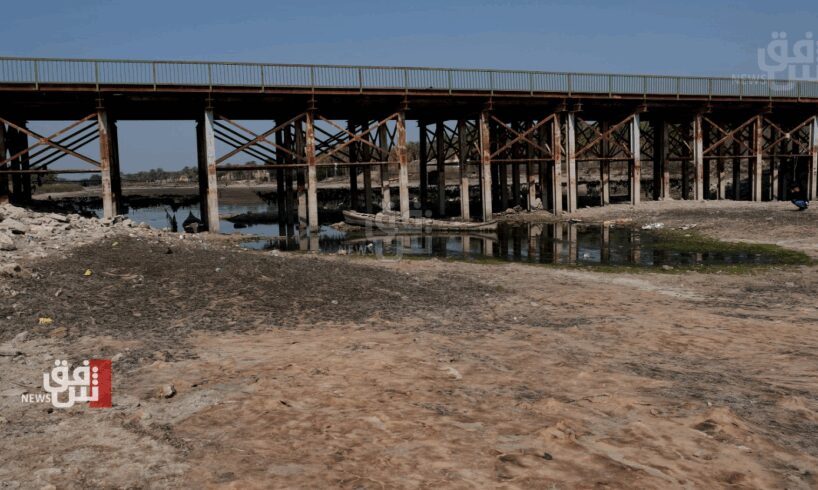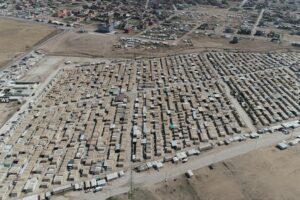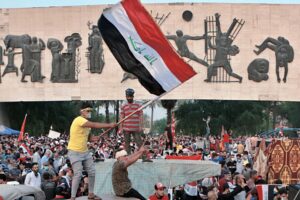
Shafaq News
Iraq is spiraling deeper into a water crisis as climate extremes,
state mismanagement, and declining river inflows from upstream neighbors
threaten to push the country toward environmental and humanitarian breakdown.
Water reserves, which once reached 21 billion cubic meters, have fallen by more
than half in the span of a year.
In southern Iraq, the consequences are becoming unmanageable.
Entire villages near the Hawizeh Marshes have gone dry, forcing families to
migrate, abandoning the only livelihood they have known.
Environmental activist Mortada al-Janoubi said the disaster is
being felt acutely in marshland areas, where livestock deaths have become
routine. Speaking to Shafaq News, he explained that “the crisis has led to mass
buffalo deaths and growing hunger across marshland communities.” These losses
are not only economic but cultural, as the Marsh Arabs—whose pastoral way of
life has persisted for centuries—now face an existential threat.
The Iraqi Ministry of Water Resources, in a public statement
issued on July 24, confirmed that the country is facing one of its most
water-stressed years in modern history. According to the ministry, 2025 is
shaping up to be Iraq’s driest year since 1933.
The statement attributed the decline to both climate
change—particularly low rainfall—and insufficient upstream water releases from
Turkiye and Iran.
The combined result has been catastrophic: inflows into the Tigris
and Euphrates basins have dropped to 27% of last year’s levels, while current
reservoir storage stands at only 8% of total capacity. This marks a 57% drop
compared to 2024. The ministry warned that such a steep decline is threatening
water availability across all provinces, particularly in the center and south,
and is severely impacting ecological systems in the marshes and along the Shatt
al-Arab.
At the heart of the crisis lies a tangle of policy failures.
Former parliamentary adviser Adel al-Mukhtar pointed to decades of poor
planning and what he described as “reckless cultivation” of
water-intensive crops like rice and wheat. These agricultural policies, he
argued, ignored basic environmental realities and were implemented without
regard for long-term sustainability.
Al-Mukhtar emphasized that Iraq’s insistence on growing
high-demand crops in the middle of a drought-prone landscape has exhausted the
country’s remaining reserves and intensified the structural fragility of its
water system.
As the water table drops, Iraq’s major rivers—the Tigris and
Euphrates—have experienced growing salinity and pollution, posing new threats
to agriculture and public health. According to Member of Parliament Zozan Ali
Kocher, losses in agriculture, fisheries, and herding are accelerating rapidly,
particularly in the southern provinces, where scarcity is fueling poverty,
displacement, and civil unrest.
Kocher told Shafaq News that although the government has decided
to reduce summer planting in order to conserve drinking water, this may not be
enough. She warned that without immediate investment in infrastructure upgrades
and strategic intervention by the state, Iraq may not be able to sustain even
its winter crops, let alone feed its population year-round.
International agreements, once seen as a possible solution, have
so far yielded limited results. A recent bilateral understanding with Turkiye
to release 400 cubic meters of water per second into Iraq’s river system was
initially welcomed as a breakthrough. But water expert Tahsin al-Musawi said
the relief was mostly symbolic.
In remarks to Shafaq News, he noted that the agreement lacked
sufficient technical oversight and practical safeguards, resulting in large
volumes of water being lost to evaporation during Iraq’s punishing summer heat.
According to al-Musawi, such outcomes are the predictable result of years of
reactive governance, where short-term deals replace long-term planning.
Meanwhile, Iraq’s hydroelectric stations remain mostly idle due to
low inflows, and in cities like Basra, residents now rely on water delivered by
tanker trucks. These visible signs of systemic collapse illustrate how degraded
infrastructure, inefficient use, and governance gaps are combining to compound
the country’s vulnerability. Al-Musawi urged a wholesale shift toward
scientific water management, including the adoption of modern irrigation
systems, the removal of illegal diversions, and a rethinking of agricultural
priorities under worsening climate stress.
In its official statement, the Ministry of Water Resources also
issued a stark warning: unless upstream states increase water releases and
internal reforms are enacted—including enforcement against illegal withdrawals
and more efficient agricultural use—Iraq’s water security may be placed in
irreversible jeopardy. The ministry explicitly called for coordinated efforts
to reduce overuse and misuse, and for urgent diplomatic engagement to prevent
further escalation.
The roots of Iraq’s water crisis run deep. Decades of
mismanagement by various ministries, compounded by political fragmentation and
weak regulatory enforcement, have left the country vulnerable to both
environmental shocks and diplomatic pressure. Agricultural policy, shaped by
electoral expediency rather than ecological evidence, has perpetuated
unsustainable practices. Meanwhile, regional water politics—especially with
Turkiye and Iran—remain unresolved, limiting Iraq’s ability to secure equitable
water flows during drought years.
According to environmental projections from international climate
institutions, Iraq could see a 10 to 20 percent decline in annual rainfall by
2050, accompanied by a rise in temperatures of 2 to 3 degrees Celsius. These
shifts will drastically increase evaporation rates and reduce surface water
availability, making every cubic meter of water more precious than ever.
In this context, continued reliance on inefficient irrigation and
water-hungry crops may lead to irreversible losses—not just in agriculture, but
in health, urban stability, and energy security.
While the Iraqi government has taken some reactive steps—such as
planting restrictions, regional water appeals, and short-term import
plans—these are no substitute for systemic reform. Without urgent reform,
Iraq’s future may be dictated not by war or oil—but by water.
Written and edited by Shafaq News staff.





